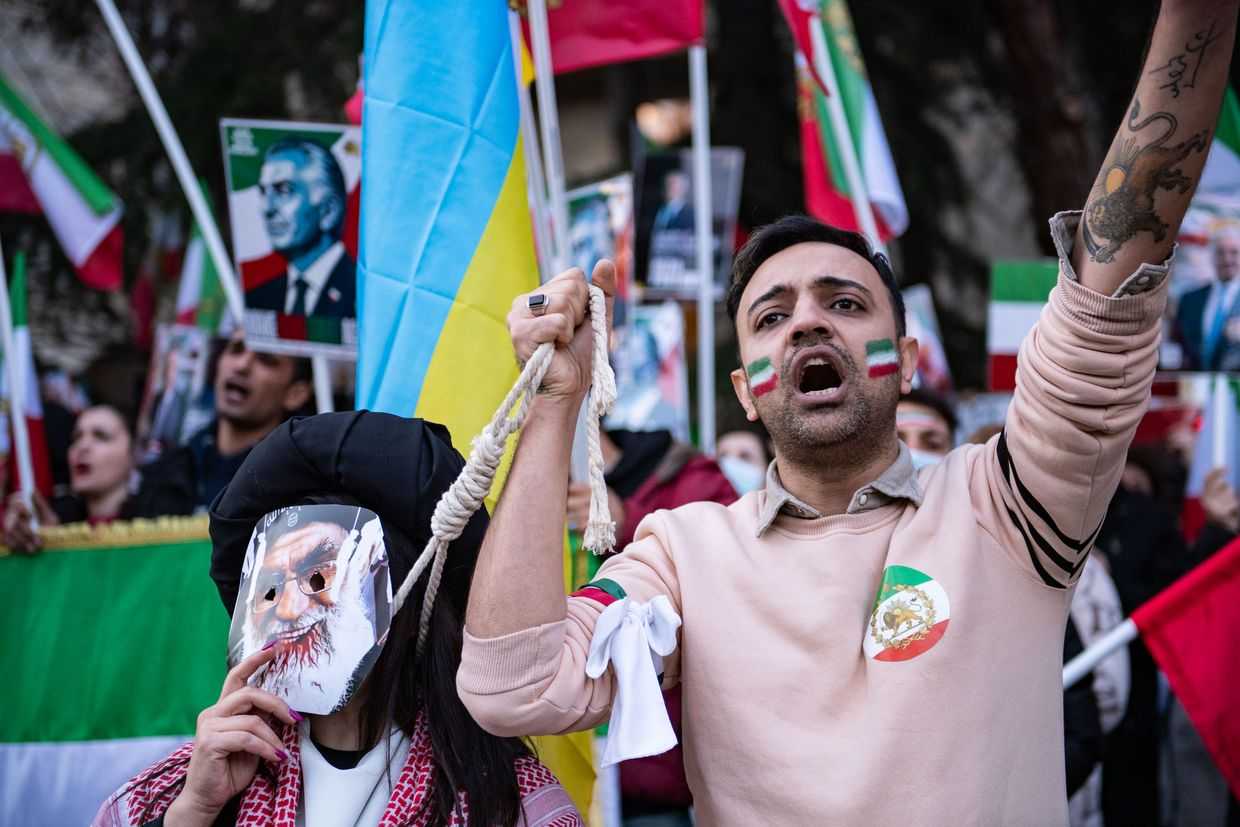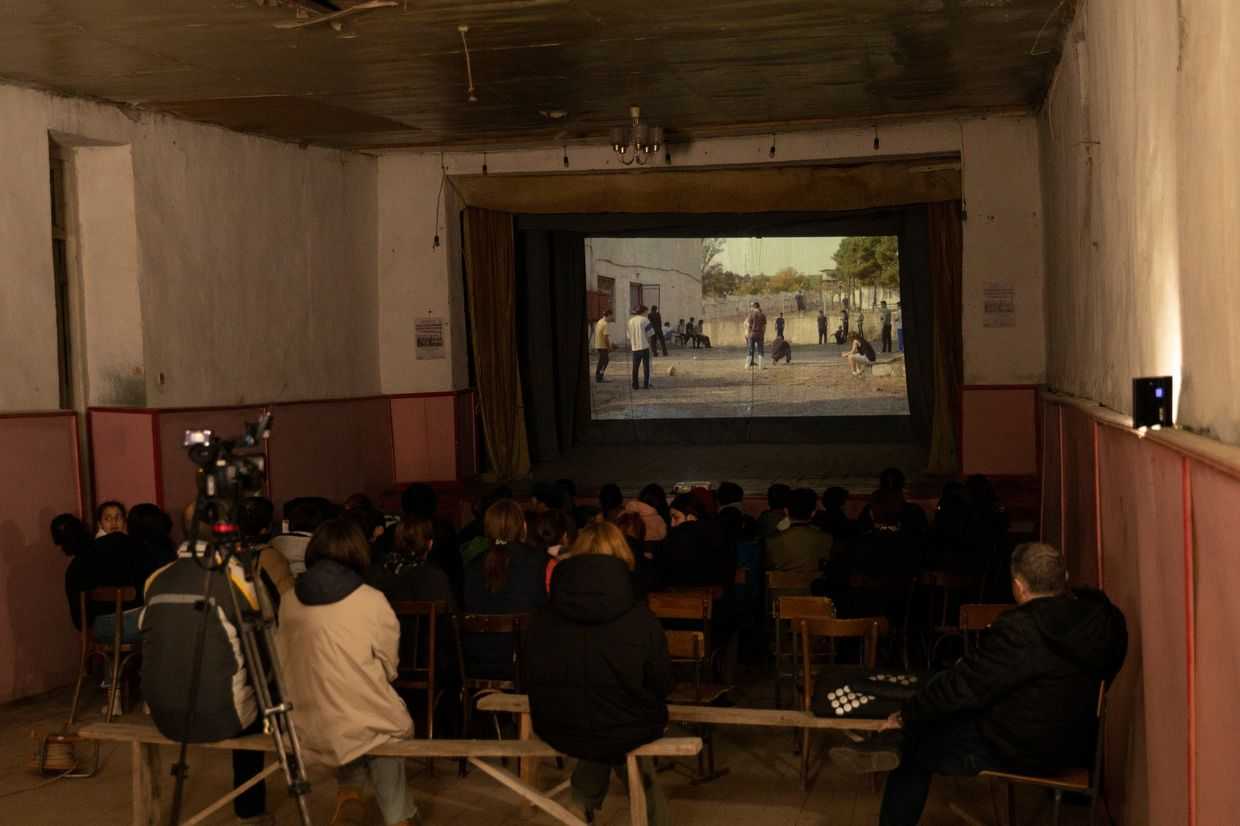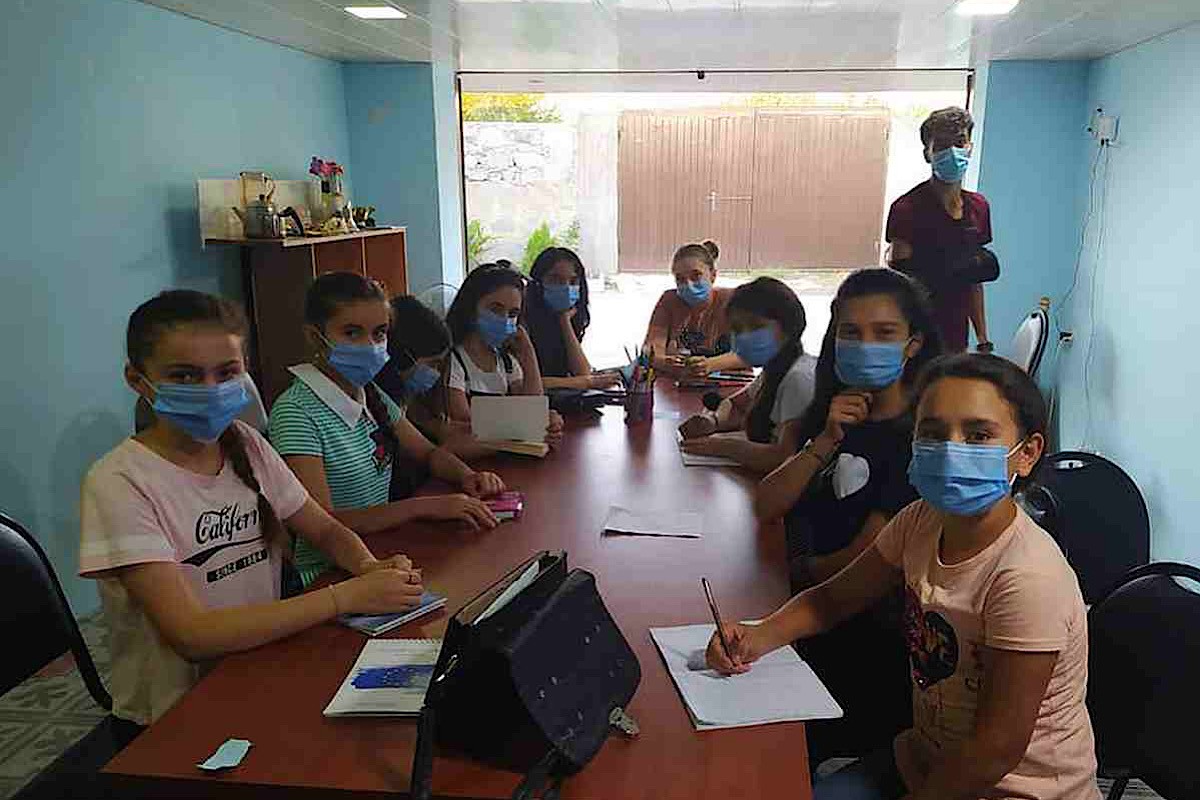
A network of education centres run by young people for young people is helping demolish barriers facing ethnic Azeris in Georgian society.
In the small village of Mollaoglu in a rural area of southern Georgia, there is a special space for the local students to gather.
Here, five years ago, Ariz Dashdemirli, 29, an ethnic Azeri and a Georgian-language teacher, transformed a part of his house into an educational centre where Azeri students, from first to 12th grade, can study, prepare for university, and help each other learn.
His colleagues from the village school as well as former students teach classes in maths, English, the Azeri language, and Azeri history — all in their mother tongue, Azeri. Dashdemirli focuses on his main goal of helping the students improve their knowledge of Georgian, because, as he points out, living isolated in a fully Azeri-speaking community, without having much contact with Georgians, has contributed to a low level of knowledge of Georgian. That has made the integration process even more arduous for Azeris here in the Marneuli district, not far from the border with Azerbaijan.
‘When Georgians used to come to our village, everyone would point at me since I was the only one who knew the language’, he recalls.
‘Once, two women from an NGO came, and they asked me what I would like to do for my village if I could. I said I would like to see the youth of my community become well-educated and enlightened. They liked my idea and told me to start writing down everything I needed, so they would fund it’, Dashdemirli says.
With support from the TASO Foundation, where the women worked, Dashdemirli and Kamran Afandiyev, a friend from the nearby village of Khuldara, proposed to open an educational centre free of charge, based on an informal learning approach.
What began as a one-room schoolhouse has now grown into a network of education centres in this Azeri-speaking area, places where young people can learn Georgian, English, or computer skills, play sports, and meet their peers from surrounding villages. Older students can prepare for university entrance exams, and adults, too, benefit from the classes. In communities where girls often have fewer opportunities than boys, the centres are helping break down barriers to higher education and fulfilling careers for women.
It started in one room
When the two young men first started the project in 2015, the venue was a small room at the Mollaoglu village school, where Dashdemirli works as a Georgian teacher. They held some small events such as book discussions and presentations. But after two years, Dashdemirli decided to move it to his home. With building materials provided by TIKA, the Turkish Cooperation and Coordination Agency, he and his students, as well as fellow villagers, built a 20-square-meter, dedicated teaching area in his house.
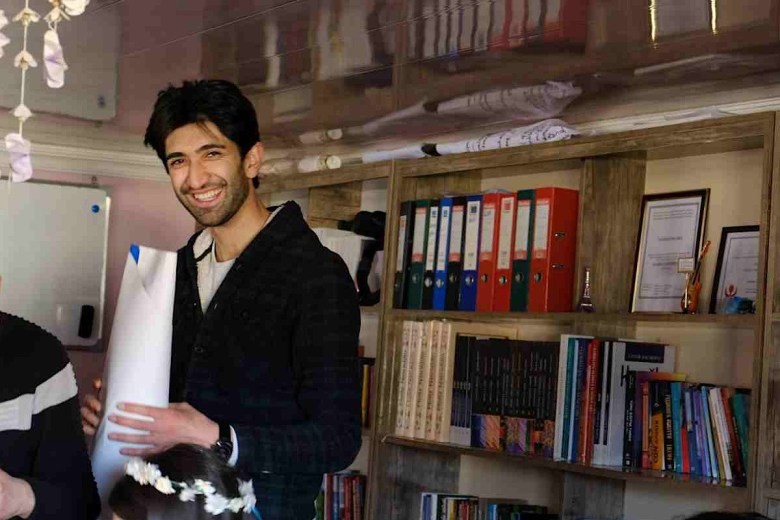
After two years, needing more space, the project branched out to Khuldara, Afandiyev’s home village. His garage became the Khuldara Public Resource centre. In 2018, the pair founded an NGO called the New Thinking Institute and even though they now run their own centres in their villages, they meet almost every day.
The students are divided into three groups: first to fifth grade, sixth to eighth, and ninth to 12th. Usually primary school teachers work with the first group and sometimes former students who are now at university come back to the village to support them. The teachers and older students teach children about computers, play games and simulations, and guide them through readings from books. Depending on the grants the project receives, the university students are paid a small salary.
‘If primary school teachers’ experience is good enough, they work with the first group of students on a one-to-one basis. Every student has a different psychology. Every one of them is valuable for us, and we want them to be unique’, Afandiyev explains.
The middle group is eligible to join a media lab for ethnic minority youth run by the Georgian Institute of Public Affairs (GIPA). Dashdemirli and Afandiyev prepare them through movie days, book clubs, and classes in computers, the Georgian language, and other subjects.
The two centre leaders mainly work with the last group of students, those preparing for university entrance exams. To imbue a sense of responsibility not just for their own education but for others as well, final-year students work with younger groups, who in turn teach the pre-sixth graders.
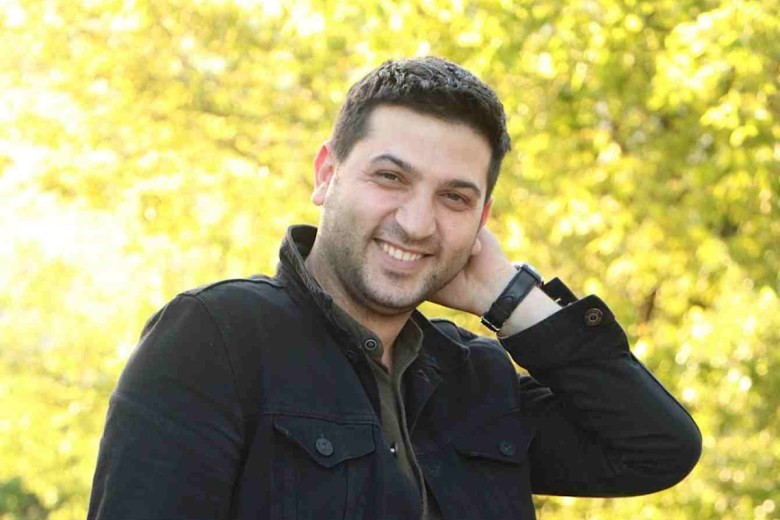
Afandiyev says the high rate of acceptance into Georgian universities is a major success of his centre.
‘The number of students accepted to universities from my centre was 17 in 2018, four in 2019, and 14 in 2020. In 2019 those four people were the only ones who prepared for the university, which means we had a 100-percent success rate in that year’, he says.
In all, 880 Georgian Azeri students were among the nearly 29,000 applicants admitted to Georgian universities for the 2019-2020 academic year, the regional news site Borchali TV reported, citing Georgian education authorities. That represents a huge step forward from 15 years ago, when as RFE/RL reported at the time, Azerbaijan’s then-ambassador to Georgia, Ramiz Gasanov, stated that out of 4,500 ethnic Azeris who graduated from high school in Georgia that year, only 27 managed to qualify for higher education in the country.
Dashdemirli and Afandiyev were among the first students to take part in the 1 + 4 programme, a project that the Georgian government began in 2009 to encourage more members of minority communities to pursue university studies. The programme includes an intensive Georgian-language course for one year prior to starting regular studies at a Georgian university – if the student first passes the university entrance exam in their native language.
More opportunities for girls and women
Learning not only the language but the customs and traditions of the Georgians is an important part of the centres’ work. Dashdemirli explains that as a part of an Open Society Foundation Georgia project, they simulate everyday life in a Georgian environment, introducing the kids to Georgian traditions, religious practices, and cuisine.
‘I am sure in the next few years we will overcome the issues related to the language barrier, because the kids are learning!’ he says, and his students confirm his enthusiasm.
‘We used to be shy, withdrawn, passive. We were not even able to introduce ourselves in Georgian’, says Sama Khalilova, an 18-year-old student at the Mollaoglu centre. ‘Now we have completely changed. For example, almost everyone who comes here [to the centre] is later accepted to university. They live in the city, they learn Georgian fluently, and they come back to the village. So, more people in the village are starting to speak Georgian.’
Her fellow student Bahar Mammadova, 17, notes the rapid progress since the centre opened.
‘My sister now studies medicine in Tbilisi, in Georgian. She told my parents that I became more active since I joined Ariz’s centre. She said when she was my age, she couldn’t speak Georgian this well. But at my age now all of us here are able to express ourselves freely in Georgian.’
Together with helping kids achieve better school results and reignite their passion to learn, the visible accomplishments of the students and the increased confidence in the teachers – who went door to door to persuade suspicious parents to allow their children to visit the centre – appear to be contributing to a more open attitude toward girls’ education.
‘Before, girls used to marry at age 14 or 15. There used to be about five weddings a month. As time passed, it decreased, and now it is very rare. Even if it happens today, we don’t go to their weddings’, Khalilova says.
‘Girls weren’t able to commute freely. We could only go to school or private tutors’, says Arzu Osmanova, 17. ‘We couldn’t meet in other places. After Ariz opened this centre and it proved itself, we could meet here or any other place, and travel to [the rest of] Georgia. Now when we just sit at home, our parents are like, “Why are you staying home? Go and learn something.”’
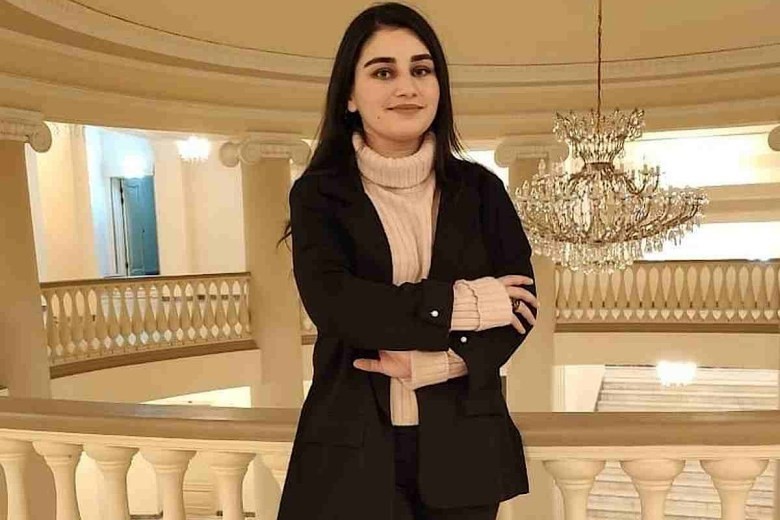
‘Ariz talked to my father and changed his mind’, Mammadova says. ‘But they never told me what they discussed. After that I was free to come here. But it was really hard to change villagers’ minds. When we were walking, everyone was bad-mouthing us, especially [saying things] about girls: “Where are they going? What do they do there? Why would a girl go out at night?” Our mothers would come home and say, “All the village women were gossiping about you.” But they don’t think like that anymore. Now, they attend and learn at the School for Mothers.’
Funded by USAID, this ‘school’ is New Thinking Institute’s latest ‘revolutionary’ project, according to Dashdemirli. Twice a week, 10 or 12 housewives and mothers gather at the Mollaoglu centre to study Georgian, English, math, and computer literacy. The goal is to enable them to help their kids with their homework, as well as empower themselves, as in the case of Sevil Nasibova, a grandmother and one of the most enthusiastic students of the school.
‘I attend every event Ariz and Kamran have held since they founded the New Thinking Institute. When I heard they had opened the School for Mothers, I decided to join because I have a little grandchild at school.’
‘Since I married very early, I left school very early as well, in the ninth grade. I had very little school knowledge. But now, I can try to help my grandkid. I’m very happy. All of us here have kids or grandkids, and we can now start to help them’ she says.
The project also helped her raise her level of Georgian, making her everyday life issues easier.
Last year, Dashdemirli and Afandiyev won a prize of around $800 when the Marneuli municipality held a competition for innovative ideas to aid local youth, with a proposal for an online essay competition in Georgian and Azeri for schoolchildren. This partnership was the first of its kind between the centres and the municipality, but Afandiyev is confident there will be more as the centres gain the trust of local officials.
Dashdemirli and Afandiyev’s efforts beyond their educational goals should also help in that regard. Together with the students, they also write grant applications to fund local initiatives. In this way, they helped build a new asphalt road in Mollaoglu and install garbage bins to reduce the amount of litter.
Reversing the Azeri brain drain
As the former head of the Centre for Integration of Georgian-Azerbaijanis, Aygul Isayeva, notes, the Soviet breakup changed the educational landscape for Georgia’s Azeris:
‘Under the Soviet Union, the state language was Russian and nobody was forced to learn Georgian. However, after its collapse, learning Georgian became mandatory, but until 2000, there was no integration plan for minorities. So it became common, especially among students, to leave Georgia for Azerbaijan after high school and continue their education in Baku.’
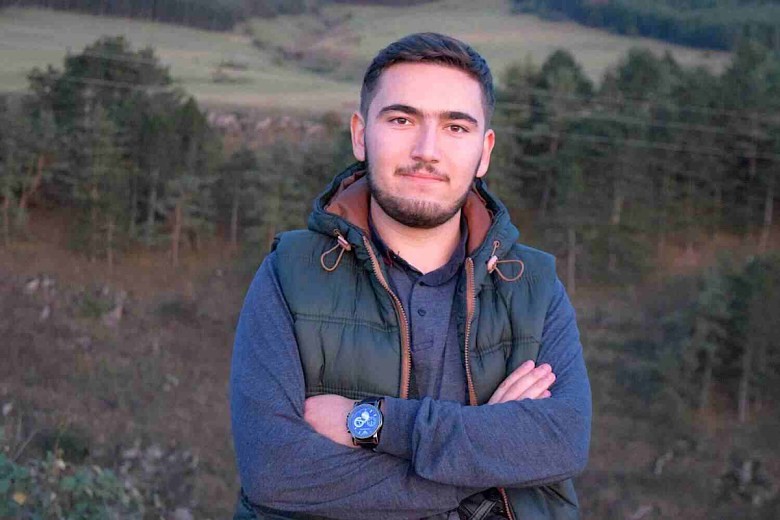
Most of Georgia’s approximately 230,000 ethnic Azeris live in the southern Kvemo Kartli region, where the Marneuli district is located. Many live in mono-ethnic villages and speak little Georgian. The Azeris community, like ethnic Armenians, also fare poorly in school, especially at the university level, where retention rates for minority students are poor compared to native Georgian speakers.
Further educational reforms are in the works. The Education Ministry is introducing what it terms ‘the New School Model’ a set of reforms aimed, among other goals, at better inclusion and improved quality of education for minority students.
According to Lela Tskitishvili, the ministry’s coordinator of ethnic minority programmes, the reforms aim to enhance the knowledge of both the state language and the minorities’ native languages and the creation of mechanisms that will attract new bilingual specialists to work in preschools and schools in regions where ethnic minorities live.
However, Tskitishvili stresses, the New School Model will reach minority schools only starting from 2023.
In the meantime, says Tamar Antadze, an anthropologist at the centre for Civil Integration and Inter-Ethnic Relations (CCIIR), the Azeri minority still needs to deal with two major issues in the field of education: the low quality of teachers and textbooks.
‘Most [teachers] don’t know Georgian – they are 60-plus years old. It is very unlikely that young teachers are teaching ethnic minorities. They [the older teachers] never rotate. They will stay there until the end of their lives’, Antadze says.
In 2012, in order to promote bilingual education reform, the Education Ministry and textbook publishers agreed to translate one textbook for each subject for the first to sixth grades into Armenian, Russian, and Azeri. Rather than translate the entire texts, however, the ministry directed publishers to leave 30% of each book in the original, Georgian text. The results of the initiative were not as expected.
‘They thought bilingual education was just a bilingual textbook where one paragraph was written in Georgian and one in Azeri. It was terrible because it was a total mess’, Antadze continues.
Although initiatives such as the 1 + 4 program have opened doors for minority students to extend their education and career prospects – and the New School Model promises further reforms – Dashdemirli and Afandiyev saw that serious problems needed to be addressed if a cohesive educational strategy for minorities were to become a reality.
While waiting for these major changes to happen, they created an alternative to the public school system that can help fill those holes.
‘After studying all our lives in Georgia, we knew where the gaps in the education system were and we decided to try to fix them. For instance, we think that learning everything by heart is a problem here. So what we try to do instead is to help our students develop their critical thinking without telling them “this is right, this is wrong”’, Afandiyev says.
The circle widens
The tangible results achieved at the Mollaoglu and Khuldara centres inspired other young people to follow the path that Dashdemirli and Afandiyev blazed.
‘The reason I started this centre was the lack of such a place for students in our village. They were unable to enjoy their leisure time and develop themselves informally. I personally had such problems. I experienced firsthand what it is like not to have informal education during the school years’, says Sakina Rustamova, the ethnic Azeri head of the Ashaghu Saral Community centre.
‘The first time I saw the centre at Kamran’s house I liked it a lot, but I never thought I could also start such an initiative. They really inspired me’, she adds.
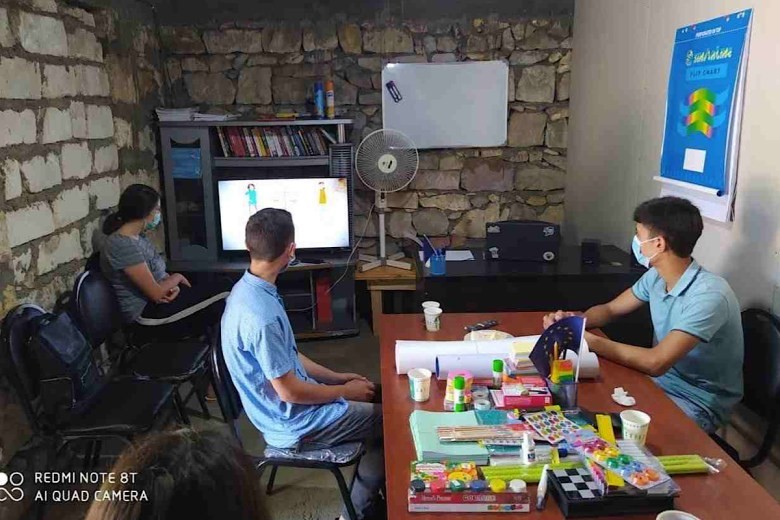
Rustamova, 24, a fresh graduate of Tbilisi State University’s law faculty, heads one of four new centres in the Marneuli district motivated by the two original, one-room schoolhouses’.
In early 2019, Rustamova spent four months being trained under the auspices of a youth empowerment project run by the Tbilisi-based Human Rights Education and Monitoring Centre (EMC), and then accepted an offer to open a centre in her village to teach Georgian, English, and chess, as well as hold training sessions.
‘Most importantly, parents and teachers welcomed my initiative’, Rustamova says. ‘This was the biggest motivation for me to start. We are thinking of expanding our centre in the near future. So much changed in our students in two years. They became more active and dream big.’
The initial group of 25 students has doubled in the two years since the centre opened. The centre, which is supported by EMC and the Open Society Foundations, has shifted all its activities online as the COVID-19 pandemic continues to affect Georgian schools.
Her experience has also changed her attitude toward integration in Georgia.
‘Previously I viewed myself as a stranger, an alien in my own country. But today I can say I’m a law-abiding Georgian citizen. If everyone living in Georgia learned and spoke Georgian fluently they would take a more active role in civic life and become more demanding of the authorities. The biggest barrier to that is the linguistic one’, she says.
Like Rustamova, Zakir Ayvazli, 21, head of the Aghmamedlo Community centre and also an ethnic Azeri, drew inspiration from the two original centres, and started thinking seriously about opening his own at a seminar organized by EMC in 2019, a place ‘that would bring progress for our community and youth.’
From just six students at the outset, the centre now teaches 30 young people.
‘We grew particularly during the pandemic, and the majority are girls. Because of the pandemic, we work via Zoom’, he explains.
The lockdown has forced the centre to curtail its teaching, Ayvazli notes.
‘We teach Georgian to those who want to learn from scratch, but at the moment we have taken a break due to the pandemic. Because we teach Georgian for beginners, mostly adults attend the class. People who have attended a Georgian-language course say their knowledge of the language has improved. So now, they are looking forward to when the lessons start again’, he says.
A magnet centre
Some of the centres have been a real success in terms of outreach and attracting pupils from surrounding villages. A case in point is the Kasumlo Youth centre.
Arzu Bayramova, the centre’s 20-year-old head, realized her dream to open her own teaching centre in 2017, when she was just 16, thanks to the support of her school principal and grants from the Christian charity World Vision International.
The centre now serves 160 children, half of them girls, from Kasumlo and three nearby villages. Some come to take classes in Georgian, English, and art; others to play sports. Bayramova says her Georgian-language students are making good progress.
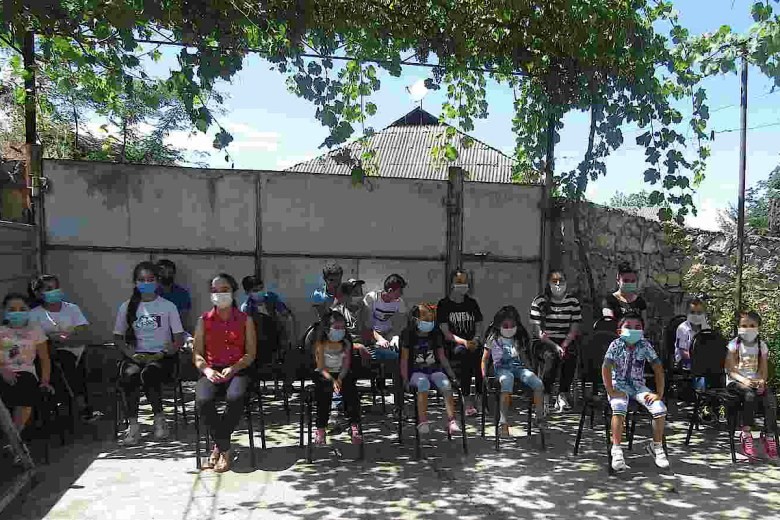
The centre can also help improve the social situation of girls and women, she believes.
‘Our teaching staff also work to prevent early marriage by attracting as many girls as possible to the centre and implementing projects tackling this problem’, she says.
The pandemic has shifted work online at Bayramova’s centre as well. Volunteers at the centre helped those villagers who don’t speak Georgian to register for pandemic-related government social support, she says.
The village centres have made progress toward one goal among others, of enhancing the Azeri community’s integration through teaching Georgian to youth and adults. However, says Kamran Mammadli – a Georgian-Azeri who heads Salam, an NGO that works for greater justice and equal treatment for minority groups – learning the majority language alone will not solve the integration problems ethnic Azeris face.
‘I speak the language, I identify myself as a Georgian, but the people here will never consider me as 100% Georgian. I think it is necessary to raise awareness among Georgians to accept and support us in our integration process.’
However, for Dashdemirli the first step to integration is the ability to communicate with the majority of Georgians:
‘To make integration possible a common language is needed. In this regard, either we have to learn the Georgian language or they have to learn our language. Since the state language is Georgian, and because there are different ethnicities living here, we have to learn and use Georgian as our common language.’
This article is a partner piece that first appeared on Transitions Online on 18 February 2021.


